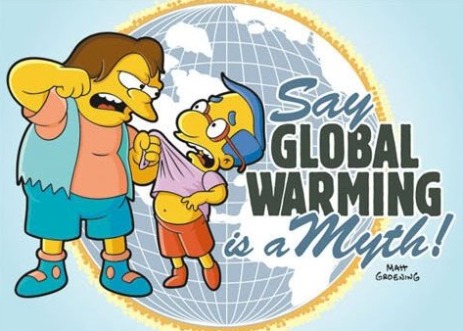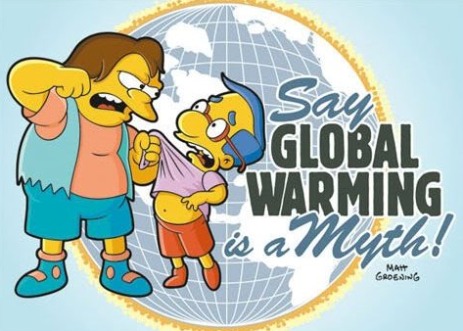 Are climate scientists the Milhouses of America?Cross-posted from Sightline’s Daily Score blog.
Are climate scientists the Milhouses of America?Cross-posted from Sightline’s Daily Score blog.
I encourage you to check out a downright awesome analysis of the treatment of global warming on The Simpsons, over at The Yale Forum on Climate Change & The Media.* Meanwhile, here’s my take.
The Simpsons phenomenon is a reminder of the power of pop culture to reflect — and shape — political attitudes. But, as Sara Peach concludes, the longest running (hardest working?) show on TV hasn’t exactly moved the public forward on the issue of climate change — in terms of basic knowledge about the actual phenomenon or the possible solutions, nor empathy for those who are concerned about it.
Still, for anyone, like me, trying to communicate about climate change, the analysis (and clips) can be instructive. The Simpsons‘ caricatures of American attitudes about global warming are not only sobering reminders of exactly what we’re up against, but also illustrate well (and I think, accurately) how messages about the highly-partisan issue can fall on deaf ears — or worse: backfire.
Of course, all this may come across as an exercise in setting unreasonable expectations for a sitcom — a cartoon no less! — to serve a greater, more meaningful function tackling society’s big political challenges. But, the fact is, The Simpsons is kind of uber-mainstream, and for all its bathroom humor, it’s indisputably political.
(Why uber-mainstream? In a media landscape where audiences are increasingly fractured by differing worldviews, the once wildly popular adult cartoon show remains consistently popular across audiences, regardless of the usual demographic or political chasms that can separate American viewing blocks — and despite its consistent, satirical and political content.)
That said, while global warming has been addressed on the show, it hasn’t received nearly as much attention or been as pointedly tackled as the writers’ “pet” political issues (recurring topics like religious intolerance, the dangers of nuclear power, and the excesses of capitalism, for example.) As Peach reports, of more than 475 episodes aired, The Simpsons has mentioned climate change in fewer than 10.
What’s instructive, nonetheless, is watching how our well-intentioned messages about climate change run the risk of further entrenching previously held views or minimizing both risk and urgency — even if it all plays out among the bright yellow citizens of a fictional town. It’s an exaggerated but correct look at Main Street America.
One example: Polled a year ago by Gallup, two-thirds of Americans said they believed global warming will not affect them in their lifetimes. Is a certain ambivalence about whether or not the effects of climate change are actually happening reinforced when, for example, Homer Simpson (however buffoonish) points to a heavy snowfall as a reason to laugh off Lisa’s warnings about the problem?
In the same vein, Tony Broccoli, a climate scientist at Rutgers University who Peach interviewed for her analysis, points out one of the challenges that has plagued climate communicators from the beginning, namely that “warming” might not actually sound very bad. Illustrating this problem, The Simpsons‘ news anchor Kent Brockman asks: “Could this record-breaking heat wave be the result of the dreaded greenhouse effect? Well, if 70-degree days in the middle of winter are the ‘price’ of car pollution, you’ll forgive me if I keep my old Pontiac.” Joke or not, this kind of message reinforces peoples’ uncertainty about the severity of the threat. When we can laugh about something like this are we off the hook for worrying or taking action?
Sadly, it may simply be that The Simpsons is a less powerful political entity than it once was — and climate change politics may be the biggest casualty of its decline. As Sara Peach writes, scholars of The Simpsons lament a deterioration of the show’s writing in general, and particularly the biting political commentary. The 1990s “golden years,” when The Simpsons hit a pinnacle of hard hitting political satire, is over.
One result, according to The Simpsons scholar Chris Turner,* has been that The Simpsons writers have relied increasingly on the most extreme and negative stereotypes of environmentalists — always good for a laugh, but not great for building empathy or issue understanding. In recent years, for example, “Lisa has been characterized as a shrill doomsayer” — not one of her more endearing roles.
Climate communications research has shown that gloom and doom messages can overwhelm people to the degree that they simply shut down and don’t want to think about the issue. The annoying, shrill, extreme environmentalist is perhaps the worst messenger to deliver information about the science of global warming. It may be that for all her good intentions Lisa — the character we’re all counting on to educate the public about climate change — serves merely to reinforce the fairly widespread public sentiment that the threat of climate change has been exaggerated (48 percent of Americans in March 2010).
Entertainment is entertainment. No one ever asked more of the show. Nonetheless, there is a sense that opportunities have been missed. “Their take on climate change has been pretty weak,” says Turner. “That’s a bit of a shame, because if there is anywhere that climate change could get a great hearing in pop culture, it would be in The Simpsons.”
*[Correction, 14 Feb. 2011: This article originally called the publication the Yale Forum on Climate Communications. The publication is The Yale Forum on Climate Change & The Media.]
*[Correction, 14 Feb. 2011: This article originally stated that Tim Delaney argued that The Simpsons writers now rely on stereotypes of environmentalists. In fact, Chris Turner made this argument.]



